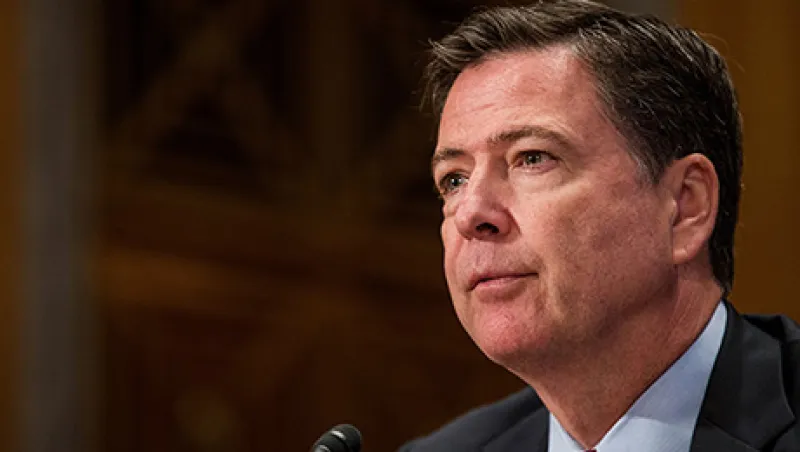Ray Dalio, the founder of Bridgewater Associates, famously lives and runs his business by 210 management principles. One of his former employees — FBI director James Comey — proved he was a diligent student of Dalio’s controversial doctrine, as the latest bombshell in a scandal-plagued presidential election cycle shows.
Comey broke with Justice Department policy and opinion on Friday by informing lawmakers of a cache of new emails relevant to the closed investigation into Hillary Clinton’s private email server. His disclosure upended the presidential race, drew stinging rebukes from senior officials, and may have violated federal law, according to the Democrats’ top senator. It also perfectly adhered to several of Dalio’s principles. Among them:
Principle No. 1: Trust in truth.
Principle No. 210: Don’t try to please everyone.
As FBI director, Comey made “a breathtakingly rash and irresponsible decision,” declared The New York Times’ editorial board. Yet as a Bridgewater alumnus, his choice to inform Congress reflected Dalio’s principles. If anything, the hedge fund’s ex-chief counsel didn’t go far enough.
The principles are Bridgewater’s sacred tenets, its Ten Commandments (give or take a couple hundred). Dalio credits the firm’s remarkable longevity (40-plus years), assets (roughly $150 billion), and performance (consistently strong) to its equally unusual culture. The firm demands “radical transparency” in the form of videotaped meetings, open performance reviews, etc., to foster a “meritocracy of ideas,” Dalio explained to financial elites at the Milken Global Conference last spring.
“It’s been operating this way for 40 years, and it’s the basis of our success,” the billionaire continued. “It’s not theoretical.”
Comey spent three years at the Westport, Connecticut-based company, which is the world’s largest hedge fund firm. (Bridgewater chose not to comment for this story.) When he joined in 2010, Comey had previously served as U.S. attorney for New York’s Southern District (in other words, as Wall Street’s top cop), deputy attorney general, and Lockheed Martin’s general counsel. Bridgewater has a weak track record for integrating senior-level hires (see: Britt Harris, Rick Bookstaber), but Comey proved a better cultural fit than most.
“I remember one client call; in comes this towering figure from the Department of Justice, and he sits on the floor,” recalls Maneesh Shanbhag, who overlapped with Comey during a five-year tenure at Bridgewater. “Comey’s message was, ‘I’m here to learn.’”
The 6-foot-8 former prosecutor is exactly the type of person one would want running the FBI, Shanbhag says. Bridgewater helped shape Shanbhag, too: He now runs an unleveraged risk-parity-type strategy at Greenline Partners. Comey, he says, “is a phenomenal guy of the highest integrity, from what little I knew. My first instinct is that political meddling isn’t Jim Comey at all.”
In that view, facing new potential evidence in a case of great public interest, the FBI director made an apolitical choice for transparency, incurring a massive political fallout.
“For Jim,” Shanbhag says, “I imagine he had to decide, ‘Do I go with this messy process where I keep people more informed?’” Abnormal transparency and messiness mark Comey’s handling of the Clinton investigation — from his chastening, “extremely careless” remark in July while arguing for no charges to Friday’s “supplement.”
Principle No. 4: Be extremely open.
“Openness leads to truth and trust,” Dalio’s manifesto states. “It’s simple — just don’t filter.” Last spring the hedge fund titan acknowledged exceptions to this rule, for example, “with your wife.” But the philosophy applies well beyond company confines to society at large, he continued.
And Comey modeled it as a public official, according to Harvard professor and leadership expert Robert Kegan. During the Bush administration, Comey refused to sign off on post-9/11 surveillance programs while acting as attorney general during John Ashcroft’s hospitalization. This episode affirmed Comey’s bipartisan reputation as the most trustworthy official in Washington, Kegan says. Yet the FBI chief hasn’t fully lived up to that reputation in recent months, especially in the last few days, Kegan says.
“I think he made a mistake,” says Kegan, who studied Bridgewater for his latest book, An Everyone Culture. “Was Comey actually being transparent in communicating what he did to the House? Did he make clear enough, ‘I don’t know anything much about the actual content of these emails’? Was he transparent enough that no one should come to any quick conclusions about what they contained?” Comey’s inscrutable message and silence thereafter “wouldn’t pass the bar at Bridgewater,” Kegan continues. “We live in this weird political vortex, where there’s no nuance. Good people, with the best of intentions, can still make mistakes. And I think that’s what happened.”
Principle No. 9: Recognize that effective, innovative thinkers are going to make mistakes.
Principle No. 17: When you experience pain, remember to reflect.
During Comey’s confirmation hearing in July 2013, Republican Senator Chuck Grassley asked about Bridgewater. “The founder of the firm embraced a philosophy called ‘radical transparency,’ which means recording a lot of meetings and encouraging junior employees to probe senior staff with checks and balances. As a strong supporter of transparency in the government,” Grassley said, “how could this philosophy apply to the FBI?”
Comey smiled. After three years of probing by radically honest 22-year-olds, no U.S. senator was going to ruffle him. “I went to Bridgewater in part because of that culture of transparency. It’s something that’s long been part of me. I think it is incumbent upon every leader to try and foster an atmosphere where people will speak truth to power,” Comey said.
“Bridgewater and the FBI are two different institutions,” the soon-to-be director concluded. “But I promise you I will carry those values with me and try to spread them as far as I can within the institution.”
A few weeks later, the U.S. Senate confirmed Comey as director of the FBI, by a vote of 93 to 1.
Leanna Orr is Global Content Director of Investor Intelligence Network (IIN), Institutional Investor's private community for asset owners.






